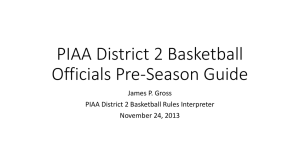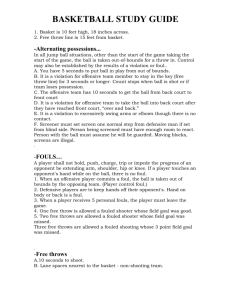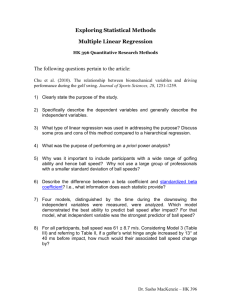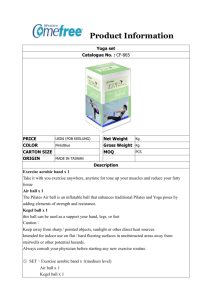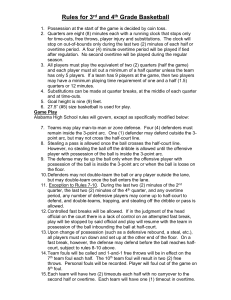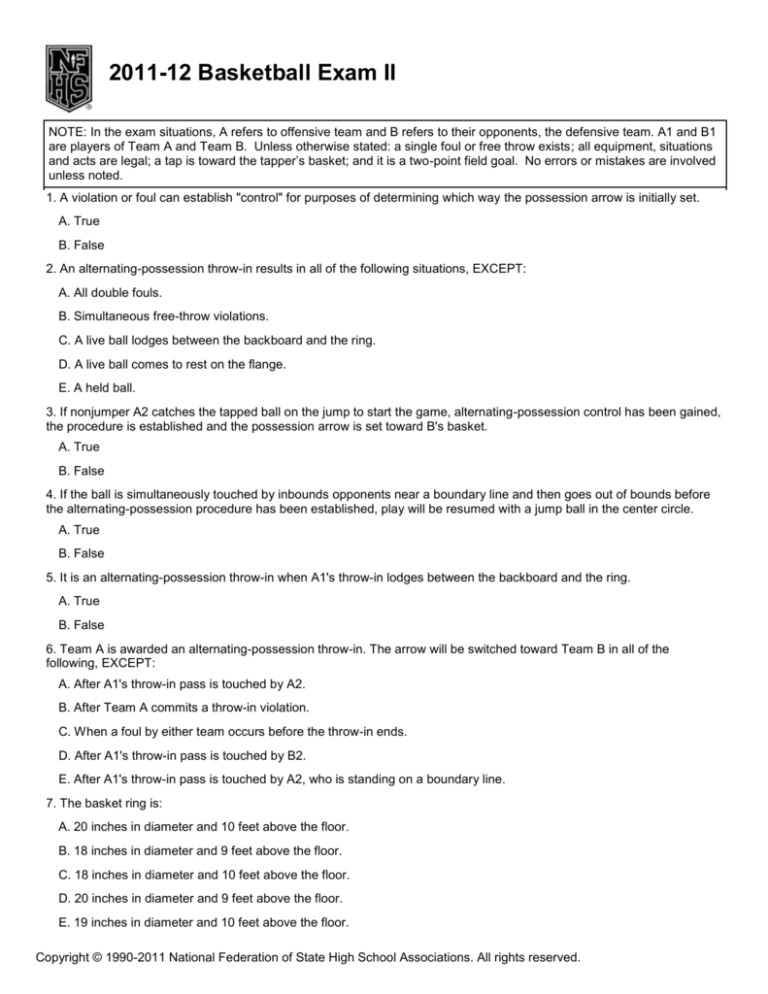
2011-12 Basketball Exam II
NOTE: In the exam situations, A refers to offensive team and B refers to their opponents, the defensive team. A1 and B1
are players of Team A and Team B. Unless otherwise stated: a single foul or free throw exists; all equipment, situations
and acts are legal; a tap is toward the tapper’s basket; and it is a two-point field goal. No errors or mistakes are involved
unless noted.
1. A violation or foul can establish "control" for purposes of determining which way the possession arrow is initially set.
A. True
B. False
2. An alternating-possession throw-in results in all of the following situations, EXCEPT:
A. All double fouls.
B. Simultaneous free-throw violations.
C. A live ball lodges between the backboard and the ring.
D. A live ball comes to rest on the flange.
E. A held ball.
3. If nonjumper A2 catches the tapped ball on the jump to start the game, alternating-possession control has been gained,
the procedure is established and the possession arrow is set toward B's basket.
A. True
B. False
4. If the ball is simultaneously touched by inbounds opponents near a boundary line and then goes out of bounds before
the alternating-possession procedure has been established, play will be resumed with a jump ball in the center circle.
A. True
B. False
5. It is an alternating-possession throw-in when A1's throw-in lodges between the backboard and the ring.
A. True
B. False
6. Team A is awarded an alternating-possession throw-in. The arrow will be switched toward Team B in all of the
following, EXCEPT:
A. After A1's throw-in pass is touched by A2.
B. After Team A commits a throw-in violation.
C. When a foul by either team occurs before the throw-in ends.
D. After A1's throw-in pass is touched by B2.
E. After A1's throw-in pass is touched by A2, who is standing on a boundary line.
7. The basket ring is:
A. 20 inches in diameter and 10 feet above the floor.
B. 18 inches in diameter and 9 feet above the floor.
C. 18 inches in diameter and 10 feet above the floor.
D. 20 inches in diameter and 9 feet above the floor.
E. 19 inches in diameter and 10 feet above the floor.
Copyright © 1990-2011 National Federation of State High School Associations. All rights reserved.
8. The ideal measurements for a high school basketball court are:
A. 94 feet by 50 feet.
B. 84 feet by 50 feet.
C. 100 feet by 50 feet.
D. 90 feet by 50 feet.
E. 84 feet by 45 feet.
9. Breakaway basket rings are prohibited.
A. True
B. False
10. The horizontal panels of a legal basketball may have alternating colors.
A. True
B. False
11. Game management shall designate the location of each team's bench.
A. True
B. False
12. Coaching-box lines shall be 2 inches wide and off the playing court.
A. True
B. False
13. State associations may alter the length and placement of the 14-foot (maximum) coaching box.
A. True
B. False
14. A red light behind each backboard or an LED light on each backboard is permitted to signal that time has expired for a
quarter or extra period.
A. True
B. False
15. The playing of music and sound effects is only permitted during pregame, time-outs, intermission and post-game.
A. True
B. False
16. Which of the following is permitted to designate the center restraining circle:
A. A ¼-inch line.
B. A 1-inch line.
C. A 2-inch line.
D. Contrasting colored-floor areas.
E. All of the above.
17. It is permissible to have the school logo or mascot on the face of the backboard.
A. True
B. False
Copyright © 1990-2011 National Federation of State High School Associations. All rights reserved.
18. A closely-guarded situation can occur when different defenders continuously guard the player holding or dribbling the
ball, provided the 6-foot distance is maintained throughout.
A. True
B. False
19. The closely-guarded distance is measured from the forward hand/arm of the defender to the forward hand/arm of the
ball handler.
A. True
B. False
20. An airborne shooter is a player who has released the ball on a try for goal and has not returned to the floor.
A. True
B. False
21. The airborne shooter is still in the act of shooting even though the ball is clearly in flight on a try.
A. True
B. False
22. Continuous motion only applies if the defensive foul is committed against the shooter.
A. True
B. False
23. There is no player control during an interrupted dribble, but there is team control.
A. True
B. False
24. Team control exists in all of the following situations, EXCEPT:
A. When a player of the team is in control.
B. While a live ball is being passed among teammates.
C. During an interrupted dribble.
D. While the ball is in flight during a try.
E. When a player of the team has disposal of the ball for a throw-in.
25. A player is officially disqualified and becomes bench personnel when the player is notified by an official.
A. True
B. False
26. A free throw ends:
A. When the try is successful.
B. When it is certain the try will not be successful.
C. When the try touches the floor or any player.
D. When the ball becomes dead.
E. All of the above.
27. The ball becomes live when it is at the free thrower's disposal.
A. True
B. False
Copyright © 1990-2011 National Federation of State High School Associations. All rights reserved.
28. If A2 violates during A1's free-throw attempt, B's throw-in will be from anywhere along the end line.
A. True
B. False
29. In a free-throw situation, the resumption-of-play procedure cannot begin if Team B is not occupying the first marked
space on each side.
A. True
B. False
30. Following a time-out, if free thrower, A1, is not in the free-throw semicircle when the administering official is ready, a
technical foul for delay is charged to A1.
A. True
B. False
31. While a player is attempting the free throws awarded for a technical foul, the other nine players must be behind the
division line, in the offended team's backcourt.
A. True
B. False
32. A simultaneous violation is called if offensive players occupy the first marked lane spaces and defensive players
occupy the second marked lane spaces during the free throw.
A. True
B. False
33. Both free throws awarded for a single technical foul must be attempted by the same player.
A. True
B. False
34. When A1 is injured and unable to attempt the free throws awarded for a personal foul, Team B's head coach may
select A1's replacement free thrower.
A. True
B. False
35. When free thrower, A1, purposefully fakes a try, it results in:
A. A technical foul assessed to A's head coach.
B. A violation on A1.
C. A team technical on Team A.
D. An unsporting technical on A1.
E. None of the above.
36. A player in a marked lane space shall position one foot near the outer edge of the free-throw lane line.
A. True
B. False
37. Restrictions on all players apply until the ball touches the ring or backboard or the free throw ends.
A. True
B. False
Copyright © 1990-2011 National Federation of State High School Associations. All rights reserved.
38. The ball becomes live in all of the following situations, EXCEPT:
A. On a jump ball, the tossed ball leaves the official's hand(s).
B. On a free throw, it is being bounced to the free thrower.
C. On a free throw, it is handed to the free thrower.
D. It is available to a player after a goal and the official begins the throw-in count.
E. On a throw-in, it is handed to the thrower.
39. The ball is dead, or remains dead, in all of the following situations, EXCEPT:
A. When a goal is made.
B. When a held ball occurs.
C. When a free-throw violation occurs by the throwing team.
D. When time expires while A1's try is in flight.
E. When time expires while A1 is dribbling.
40. A coach is prohibited from using cards or signs to communicate with players on the court.
A. True
B. False
41. The head coach is responsible for the conduct of all bench personnel.
A. True
B. False
42. An indirect technical foul is assessed to the head coach when bench personnel is charged with a technical foul.
A. True
B. False
43. Assistant coaches may stand to confer with bench personnel during any dead-ball period.
A. True
B. False
44. The head coach is assessed a direct technical foul in all of the following situations, EXCEPT:
A. Permitting team members to leave the bench area and/or playing court for an unauthorized reason.
B. Permitting a team member to participate while wearing an illegal uniform.
C. Permitting a team member to participate after being removed from the game for disqualification.
D. Failing to replace or remove a disqualified or injured player within 20 seconds when a substitute is available.
E. Permitting a team member to dunk during the pregame warmup.
45. To correct an error it must be recognized by an official during the first dead ball after the clock has properly started.
A. True
B. False
Copyright © 1990-2011 National Federation of State High School Associations. All rights reserved.
46. All of the following are ruled correctable errors, EXCEPT:
A. Failure to award a merited free throw.
B. Erroneously awarding the ball to the wrong team for a throw-in.
C. Permitting a wrong player to attempt a free throw.
D. Attempting a free throw at the wrong basket.
E. Erroneously counting or canceling a score.
47. When an error involving awarding a merited free throw is corrected and no change of team possession occurred, play
shall continue following the free throw(s) as though there had been no correction.
A. True
B. False
48. If a technical foul is administered to start an extra period, a jump ball will follow to establish the alternating-possession
procedure.
A. True
B. False
49. If the score is 64-62 when the fourth quarter has ended, a subsequent technical foul penalty on the leading team must
be administered to determine if an extra period is required.
A. True
B. False
50. The length of intermission between the end of regulation play and the first extra period is one minute.
A. True
B. False
51. Teams shall change baskets for each extra period played.
A. True
B. False
52. Once the ball becomes live in an extra period, the extra period will be played even though a correction in score is
made.
A. True
B. False
53. Extra periods are an extension of the fourth quarter.
A. True
B. False
54. The length of each extra period for a varsity contest shall be:
A. 3 minutes.
B. 4 minutes.
C. 5 minutes.
Copyright © 1990-2011 National Federation of State High School Associations. All rights reserved.
D. 6 minutes.
E. None of the above.
55. Contact after the ball has become dead is ignored, unless it is ruled intentional or flagrant, or committed by or on an
airborne shooter.
A. True
B. False
56. A situation in which there is a foul by both teams at approximately the same time, but the fouls are not committed by
opponents against each other, is known as:
A. A simultaneous foul.
B. A double foul.
C. A false double foul.
D. A multiple foul.
E. A false multiple foul.
57. A situation in which two or more teammates commit personal fouls against the same opponent at approximately the
same time is known as:
A. A multiple foul.
B. A double foul.
C. A simultaneous foul.
D. An intentional foul.
E. A false double foul.
58. An intentional foul may be either personal or technical.
A. True
B. False
59. An intentional foul is judged solely by the severity of the act.
A. True
B. False
60. Technical fouls include all of the following, EXCEPT:
A. A foul by a nonplayer.
B. A noncontact foul by a player.
C. A contact foul while the ball is live.
D. A contact foul while the ball is dead, except a foul by an airborne shooter.
E. A direct technical charged to the head coach as a result of his/her actions.
61. The ball is in A's backcourt when A1 holds the ball straddling the division line and then pivots on the foot which is in
A's frontcourt.
A. True
B. False
62. A ball which is in flight retains the same status it had when last in contact with a player or the court.
Copyright © 1990-2011 National Federation of State High School Associations. All rights reserved.
A. True
B. False
63. During a dribble from backcourt to frontcourt, the ball is in A's frontcourt if one of dribbler A1's feet is on the division
line and the other foot and the ball are touching in A's frontcourt.
A. True
B. False
64. Teammates may not occupy adjacent spots along the center restraining circle if an opponent desires a place between
them and indicates this desire before the official is ready to toss the jump ball.
A. True
B. False
65. Nonjumpers may break the plane of the center-restraining circle when the official tosses the jump ball.
A. True
B. False
66. The tossed ball must be tapped by one or both of the jumpers after it reaches its highest point.
A. True
B. False
67. Neither jumper shall leave the center-restraining circle until the jump ball has been touched.
A. True
B. False
68. A jumper is required to be in his/her proper half of the center restraining circle during a jump ball, but is not required to
face his/her own basket.
A. True
B. False
69. If A2 and B2 simultaneously control the opening jump ball, another jump ball between any two opponents in the center
circle results.
A. True
B. False
70. A bookkeeping mistake can only be corrected by the officials if it is recognized by the first dead ball after the mistake.
A. True
B. False
71. The official shall instruct the timer to begin the 20-second interval for replacing an injured player as soon as the game
has been stopped for the injury.
A. True
B. False
72. All of the following statements regarding officials' jurisdiction are true, EXCEPT:
A. Jurisdiction begins prior to the game when the officials arrive on the floor.
B. Jurisdiction extends through periods when the game may be momentarily stopped for any reason.
C. Jurisdiction is terminated when all officials leave the visual confines of the playing area.
D. Jurisdiction ends when the referee approves the final score.
E. Officials shall arrive on the floor at least 15 minutes before the scheduled starting time of the game.
73. All of the following describe general duties of any game official, EXCEPT:
Copyright © 1990-2011 National Federation of State High School Associations. All rights reserved.
A. Make decisions on any points not specifically covered in the rules.
B. Administer penalties.
C. Grant time-outs.
D. Put the ball in play.
E. Beckon substitutes to enter the court.
74. All of the following are pregame duties of the referee, EXCEPT:
A. Be responsible for having each team submit its roster and starters before the 10-minute mark.
B. Designate the official timepiece and official timer.
C. Designate the official scorebook and official scorer.
D. Be responsible for having each team notified three minutes before the game is to begin.
E. Inspect and approve all equipment.
75. The referee may designate any official to toss the jump ball to start the game.
A. True
B. False
76. An official shall immediately remove a player from the game who exhibits the following signs or symptoms of a
concussion:
A. Dizziness.
B. Confusion.
C. Headache.
D. Loss of consciousness.
E. All of the above.
77. The referee may not permit a game to continue if either team has only one participating player.
A. True
B. False
78. The referee has the authority to prohibit players from wearing equipment that is inappropriate or confusing to other
players.
A. True
B. False
79. The ball is out of bounds if it touches an official who has either one or both feet contacting a boundary line.
A. True
B. False
80. The ball is out of bounds in all of the following situations, EXCEPT:
A. When the ball touches any object on or outside a boundary line.
B. When the ball touches the supports or back of the backboard.
C. When the ball touches the ceiling, overhead equipment or supports.
D. When the ball touches the side of a rectangular backboard.
E. When the ball passes over a rectangular backboard.
81. The ball is caused to go out of bounds by B1, who deflects A1's throw-in pass that then touches thrower A1 in flight,
who is still out of bounds.
A. True
Copyright © 1990-2011 National Federation of State High School Associations. All rights reserved.
B. False
82. The ball is awarded out of bounds after:
A. A violation.
B. A free throw for a technical foul.
C. A field goal or an awarded goal.
D. A held ball.
E. All of the above.
83. A substitute may enter between quarters and during time-outs without being beckoned by an official.
A. True
B. False
84. A team must begin the game with five players.
A. True
B. False
85. Substitutions between halves may be made by:
A. A team representative.
B. The official scorer.
C. The public-address announcer.
D. The timer.
E. None of the above.
86. If a substitute has not properly reported, the five Team A players who ended the second quarter shall begin the third
quarter.
A. True
B. False
87. The official shall grant a captain's request for a defensive match-up if three or more substitutes from the same team
enter the game during a substitution opportunity.
A. True
B. False
88. A substitute becomes a player when he or she legally enters the court to participate.
A. True
B. False
89. If a substitute enters illegally, he/she becomes a player after the ball becomes live.
A. True
B. False
90. B1 fouls A1 and B1 is replaced; B1 may return between A1's first and second free throws.
A. True
B. False
Copyright © 1990-2011 National Federation of State High School Associations. All rights reserved.
91. If a player is directed to leave the game for a violation of the uniform rule, the coach may call a time-out to keep the
player in the game.
A. True
B. False
92. A1 is sent to the bench because of bleeding from a cut. Team A calls a 60-second time-out, during which the athletic
trainer stops the bleeding and covers the wound. Which of the following statements is the most accurate?
A. A1 may only re-enter the game at the next opportunity to substitute.
B. A1 may re-enter the game if Team A calls another time-out.
C. A1 may re-enter the game at the end of the charged time-out.
D. A substitute is required for A1.
E. None of the above.
93. Any player who exhibits signs, symptoms or behaviors consistent with a concussion shall not return to play until
cleared by:
A. The head coach.
B. A parent or guardian.
C. The athletic director.
D. An appropriate health-care professional.
E. All of the above.
94. Only a defensive player can commit basket interference.
A. True
B. False
95. It is a violation on dribbler A1 when a five-second, closely-guarded count is reached in A's backcourt.
A. True
B. False
96. Excessive swinging of arms or elbows without contacting an opponent can be either a foul or a violation.
A. True
B. False
97. If on a free throw by A1, a fake by B1 in a marked lane space causes A2 to violate, only the fake is penalized.
A. True
B. False
98. It is a violation when during a designated spot throw-in by A1, A2 is out of bounds.
A. True
B. False
99. It is a violation if A1 causes the ball to enter and pass through the basket from below.
A. True
B. False
100. It is a violation if A1 dribbles a second time after losing control of the first dribble because an opponent touched the
ball.
A. True
B. False
Copyright © 1990-2011 National Federation of State High School Associations. All rights reserved.
NFHS Exam -Answer Key
2011-12 Basketball Exam II
Question
1.
2.
3.
4.
5.
6.
7.
8.
9.
10.
11.
12.
13.
14.
15.
16.
17.
18.
19.
20.
21.
22.
23.
24.
25.
26.
27.
28.
29.
30.
31.
32.
33.
34.
35.
36.
37.
38.
39.
40.
41.
42.
43.
44.
45.
46.
47.
48.
49.
50.
51.
52.
53.
54.
Answer Choice
Answer Text
Rule Reference
A
True
4-3-3;6-4-1
A
All double fouls.
6-4-3
A
True
4-3-1
A
True
6-4-3 Note
B
False
9-2-8 Pen; 6-4-3
C
When a foul by either team occurs before the throw-in ends. 6-4-4; 6-4-5
C
18 inches in diameter and 10 feet above the floor.
1-10-1; 1-11-1
B
84 feet by 50 feet.
1-1
B
False
1-11-2
B
False
1-12-1a
A
True
1-13-1
A
True
1-13-2
A
True
1-13-2 Note
A
True
1-14
A
True
1-18
E
All of the above.
1-3-1
B
False
1-7-4
A
True
4-10
B
False
4-10
A
True
4-1-1
A
True
4-1-1;4-41-1
B
False
4-11-1
A
True
4-12-1,2
D
While the ball is in flight during a try.
4-12-2
B
False
4-14-2
E
All of the above.
4-20-3
A
True
6-1-2c
B
False
7-5-2c;9-1 Pen 1a
B
False
8-1-2
B
False
8-1-2
B
False
8-1-3; 8-1-5
A
True
8-1-4c; 9-1-2 Pen 3
B
False
8-3
B
False
8-2
B
A violation on A1.
9-1-3b Pen 1
A
True
9-1-3g
A
True
9-1-4
B
On a free throw, it is being bounced to the free thrower. 6-1-2; 4-4-7
D
When time expires while A1's try is in flight.
6-7
B
False
10-1-3
A
True
10-4
A
True
10-4 Pen
B
False
10-4-4
E
Permitting a team member to dunk during the pregame warmup.
10-5
A
True
2-10-2
B
Erroneously awarding the ball to the wrong team for a throw-in.
2-10-1
A
True
2-10-6
B
False
4-3-3b; 5-6-2 Exc. 4
A
True
5-6-2 Exc 4
A
True
5-7-1
B
False
5-7-1
A
True
5-7-4
A
True
5-7-3
B
4 minutes.
5-7-3
Copyright © 1990-2011 National Federation of State High School Associations. All rights reserved.
55.
56.
57.
58.
59.
60.
61.
62.
63.
64.
65.
66.
67.
68.
69.
70.
71.
72.
73.
74.
75.
76.
77.
78.
79.
80.
81.
82.
83.
84.
85.
86.
87.
88.
89.
90.
91.
92.
93.
94.
95.
96.
97.
98.
99.
100.
A
A
A
A
B
C
B
A
B
A
B
A
A
A
B
B
B
D
A
A
A
E
B
A
A
D
B
E
A
A
A
A
A
A
A
B
B
C
D
B
B
B
A
A
A
B
True
4-19-1 Note
A simultaneous foul.
4-19-10
A multiple foul.
4-19-11
True
4-19-3
False
4-19-3
A contact foul while the ball is live. 4-19-5
False
4-4-2
True
4-4-3
False
4-4-6
True
6-3-3
False
6-3-5a
True
6-3-6
True
6-3-7b
True
6-3-8 Note
False
6-4-3 Note
False
2-11-11
False
2-12-5 Note
Jurisdiction ends when the referee approves the final score. 2-2-2,3,4
Make decisions on any points not specifically covered in the rules. 2-3; 2-7
Be responsible for having each team submit its roster and starters before the 10-minute mark.
True
2-5-1
All of the above.
2-8-5
False
3-1-1 Note
True
3-5-1
True
4-4-4;7-1-2a(2)
When the ball touches the side of a rectangular backboard. 7-1-2
False
7-2
All of the above.
7-4-4
True
10-2-2
True
3-1-1 Note
A team representative.
3-3-1a
True
3-3-1a Note
True
3-3-1e
True
3-3-3
True
3-3-3
False
3-3-4
False
3-3-4; 3-3-5
A1 may re-enter the game at the end of the charged time-out.
3-3-7
An appropriate health-care professional.
3-3-8
False
4-6; 9-11
False
9-10-1a
False
9-13; 4-24-8
True
9-1-4 Pen 4d
True
9-2-11
True
9-4
False
9-5-2
Copyright © 1990-2011 National Federation of State High School Associations. All rights reserved.
2-4

